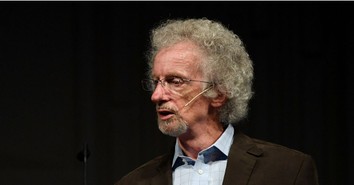What Does the Bible Teach through Paradoxes?

Paradoxes are a unique way of communicating. Somehow, two things are put together that communicate something profound through their contradiction. Take these for example: Socrates famously said: "I know one thing, and that is that I know nothing." Which is it? Does he know nothing or the one thing which is nothing? You can't know both nothing and something! Or what about Vince Lombardi's observation: "Once you learn to quit, it becomes a habit." You can only have a habit if you do something over and over, and quitters don't do that! These are head-scratchers, right? And these are just everyday paradoxes. The Bible is full of them, and they're immensely important in helping us understand God, ourselves, and the world.
What Is a Paradox?
If you were to google "paradox," you'd probably get something like: "A self-contradictory statement that when explained may be true."
It's not a bad definition, but since we're talking Scripture here, and Scripture is ultimately from God, the truth will be what we're after. We don't want to know what may be true about God; we want to know what is true about God. So here's my definition: "A paradox is Truth, held in the tension of contradiction." Notice the capital "T"? It's the big truth stuff, not just that 2+2=4 but the Truth about God's nature, power, and interaction in the world. It's the big stuff! And since you'll probably want to know how it affects you, let's say it this way: "Paradoxes are how we discover the Truth about you and God, in the tension of contradiction."
So let's do that. Here are three huge paradoxes found in Scripture that communicate something significant about you and God. Note: The three examples below are taken from my book that came out this year called: Paradox: Discovering the Truth about You and God in the tension of contradiction.
Paradox #1: With Jesus, impossible is the new possible.
Early on in Jesus' ministry, his credentials were questioned pretty regularly. People thought they knew His parents, where He was really from, who He was (and wasn't), and what He was about. But that all changed in a very crowded room, in a small house outside of Jerusalem in the 1st century. Many people had gathered to hear Jesus teach, including His disciples, the house owners, the neighbors, the religious ruling class, and anyone who happened to be in the area. Jesus was known as a teacher and a healer by this point, so a brave group of friends brought their immobile friend to Jesus to see if He could give the man the ability to walk.
At one point during the encounter, he asked what appeared to be a very easy question in Luke 5:23: "Which is easier: to say, 'Your sins are forgiven,' or to say, 'Get up and walk'?"
They all knew the answer to this question. It was "Your sins are forgiven" because you couldn't see forgiveness — but you could tell if a once crippled man could suddenly walk! Jesus had already told the man that his sins were forgiven, which highly bothered the religious folk, while the rest of the people probably just shrugged. How could you tell if it was true or not? They may have just been words. And then Jesus complicates the matter a bit, because to the surprise of everyone in the room, the crippled is told to get up, take his mat and go home — and he can.
Uh oh, this is a bit awkward. If Jesus could do that, guess what else they had realized was a real possibility? That Jesus could actually forgive sins. But if only God could do that, then what did that say about this man named Jesus? Surely He was more than a man, right?
The Truth about God:
The Truth about God is that He often works in ways we see as improbable and impossible. As Christians, we seem to think God simply can't work in some ways, situations, or through certain circumstances. People in the 1st century thought that too. And then Jesus just caused them to question everything they thought was possible with God. Maybe you should too?
The Truth About You:
The Truth about you is, you sometimes think that just because you can't see God at work in the world or in your life, that He isn't doing anything. Maybe like the forgiveness that couldn't be seen in the story, God is working in powerful ways in your life, but you just can't see it or haven't realized it yet?
Paradox #2: Suffering is a blessing.
I don't know anyone who prays for and seeks suffering. That wouldn't be just weird, but wildly unhealthy. And yet, somehow, suffering is unique in the sense that God does some of His best work through it. Through suffering, God brings something meaningful from something terrible. God isn't the cause of the suffering, but He can bring good from it. The writer of Hebrews draws a direct correlation:
Hebrews 2: In bringing many sons and daughters to glory, it was fitting that God, for whom and through whom everything exists, should make the pioneer of their salvation perfect through what he suffered.
There was no other way. As Christians, we usually highlight that God died for us, and rightly so, but it can be easy to forget that He also suffered for us. God didn't have to do that; He chose to. It's what makes the life of Jesus and His selfless act on our behalf even more incredible. God allowed Himself to be humiliated, tortured, and finally killed — terrible things that we should have experienced if we take the impact of our sin against God seriously. He truly blessed us through His suffering. Through the loss of His life, we could gain ours. Because He suffered, we could be blessed.
The Truth about God:
The Truth about God is, He suffered for you and me willingly. It was the plan. From the moment sin entered the world, God intended to suffer and die on your behalf. God blessed us through His own suffering. How crazy is that!
The Truth About You:
The Truth about you is, you don't want to suffer. Not even for a moment, but there are some things we can only get through suffering. Some parts of our faith can only be built and grown through suffering. Don't seek to suffer, but if it comes, see how God may be using it to draw you closer to Him.
Paradox #3: Bad news is good news.
There are a ton of other paradoxes in the Bible, but let me mention just one more, and it's an important one: it's the idea that bad news actually gets us to the good news. When someone goes to the doctor, they'll usually be given three pieces of information: the diagnosis, the prognosis, and the cure.
The diagnosis tells us what's wrong with us. It may be as simple as "your arm is broken" to "you have cancer." The prognosis is what will happen to you if you're left untreated. If you don't put your arm in a cast, it will remain crooked and broken, or if you don't kill the cancer, it will kill you. The cure is the treatment that will make your arm useable again or help you continue to live by killing the cancer.
Christianity has its own set of these three pieces of information. The diagnosis is, we've "all fallen short of the glory of God" (Romans 3:23) because of our sin. It's the default human condition. The prognosis is "death" is the natural and spiritual consequence of being in and remaining in our sin (Romans 5:12). The cure is that through Jesus Christ, we can receive the gift of eternal life from God (Romans 6:23) and that sin no longer is our master — God is.
Here's the thing: the offer from God, the "good news" of how God has rescued us from ourselves through Christ, is more generous than we thought when we realize how bad the bad news is. Without Christ, the bad news is that we're terrible people who will naturally separate ourselves from God in this life temporarily and in the next life eternally if left to ourselves. When we realize that's our default state, that we've been incredibly offensive and harmful to God, it softens our hearts to the point of surrender when we're confronted with the fact that instead of God leaving us to our flawed selves, He gave us His good self. He's the reason that the bad news paradoxically leads us to the good news.
The Truth about God:
The Truth about God is, He could have given us exactly what we deserved: to live life for ourselves, apart from Him for now and throughout eternity. It wouldn't have been His fault at all.
The Truth About You:
The Truth about you (and I) is that apart from God, we don't have a shred of goodness in us. Jesus was clear when He said, "no one is good but God alone." He's right. You and I aren't good, but God is. And He chose to be good to us.
These are just three of the pivotal paradoxes in the Bible, but if you open it up and poke around for 5 minutes, you'll find a lot more, including how God is both one in essence and three in personhood. You'll discover that Jesus Himself is a walking paradox as He is both God and man, both limitless and finite.
Paradoxes may be hard to understand, but they're one of the best ways to understand who God is and how He operates. The power of paradoxes is understanding that something that can't be true actually is.
Photo credit: ©GettyImages/francescoch
Kile Baker is a former Atheist who didn’t plan on becoming a Christian, let alone a Pastor, who now writes to try and make Christianity simple. Kile recently wrote a study guide to help people “look forward to and long for Heaven.” You can get one on Amazon here. He also writes at www.paperbacktheologian.com. Kile is the grateful husband to the incredibly talented Rachel, Dad to the energetic London and feisty Emma and Co-Lead Pastor at LifePoint Church in Northern Nevada. He single handedly keeps local coffee shops in business.
Originally published October 27, 2021.







